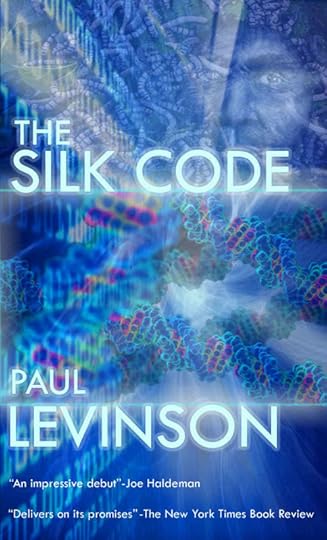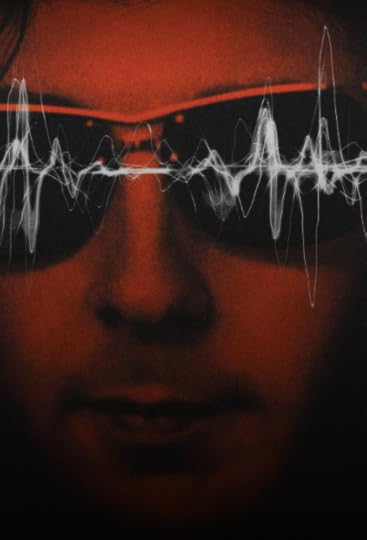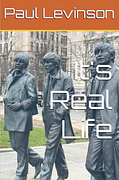Paul Levinson's Blog: Levinson at Large, page 47
November 18, 2022
Authors to be in Amazing Stories special Sol System issue

(photo not in alphabetical order) Adam-Troy Castro, Dave Creek, Paul Di Filippo, David Gerrold, Mur Lafferty, Paul Levinson, Cat Rambo, Veronica Scott, Bruce Sterling, John E. Stith, Somtow Sucharitkul, Peter Watts, Frank Wu, Jay Werkheiser, and Oghenechovwe Donald Ekpeki https://amazingstories.com/kickstarter Paul Levinson's books ... Paul Levinson's music
November 13, 2022
Podcast Review of The Peripheral 1.3-1.5
Welcome to Light On Light Through, Episode 343, in which I review The Peripheral episodes 1.3-1.5 on Amazon Prime Video.
Written posts of this review: 1.3: John Snow ... 1.4-1.5 Lev's Tea and the AI Therapy Further reading: alternate realities about The Beatles (It's Real Life) ... time travel (Slipping Time) Mentioned in this episode: upcoming special issue of Amazing Stories
Paul Levinson's books ... Paul Levinson's music
November 11, 2022
The Peripheral 1.5: The AI Therapist

The mention of an "ai therapist" caught my attention in the first few minutes of The Peripheral 1.5 on Amazon Prime Video tonight. It reminded me of Joseph Wezenbaum's ELIZA program at MIT in, what, our late nonfiction 1960s? His program passed the test of being thought to be a human psychologist by subjects who communicated with it and didn't know they were exchanging information with a cleverly programmed computer.
Information is what this episode, which continued to be excellent, was all about. (Makes sense, in an episode of a series which is prime cyberpunk.) In one of the best scenes, Flynne explains to her mother that she did not get her medicine from the future. Rather, Flynn got information in the future about how to make this powerful medicine, which in a nice touch was "printed" (Flynne's word) on a 3-D printer.
Flynne goes on travel to the future -- informationally -- to ask Wilf he was trying to seduce her via the haptic union they had, and he either plays dumb or honestly tells her he has no idea what she's talking about. Meanwhile, it becomes palpably clear, once again, that not just information can travel from the future to the past when a car materializes and crashes into the police car carrying the Irish assassin with an ok American accent. But did the car that hit the police car really come from the future, just like the coffee container a few episodes back, or was the car printed in the past (which is more or less the present in the story), and somehow teleported to collide with the police car? Come to think of it, could the coffee have come from a current printer, too? With all those expresso commercials with fancy machines on TV these days with Brad Pitt, somehow the idea of 3-D printing coffee doesn't seem that absurd.
It's almost enough to get you to a therapist, though an AI therapist in this case likely wouldn't be the best. Speaking of which, the episode ends -- apologies, I didn't advise you about spoilers -- with Flynne's avatar in the future rendering the powerful Cherise into unconsciousness in a fight. So, how did Flynne become such a proficient fighter? Maybe she picked up some useful martial information from the future.
See also The Peripheral 1.1-1.2: Cyberpunk, Time Travel, and Alternate Reality ... 1.3: John Snow ... 1.4 Who Took Lev's Tea?
alternate reality about The Beatles on Amazon, and FREE on Vocal
Paul Levinson's books ... Paul Levinson's music
Science Fiction and Fantasy Song playlist
November 9, 2022
Amazing Stories coming back with Sol System Special Issue

Amazing Stories is coming back with a special Sol System issue of new science fiction stories about adventures in space in our solar system -- including one by me, which picks up where my 2002 novel Borrowed Tides left off -- https://www.kickstarter.com/projects/...
Paul Levinson's books ... Paul Levinson's music
November 6, 2022
The Mosquito Coast 2.1: Thirteen Years Ago

The Mosquito Coast was back with the first episode of its second season on Friday on Apple TV+. It took the tack of providing the background story of what set the Fox family off into the dire straits they were in last time we saw them, in the first season, and ...
[Spoilers ahead ... ]
Well, because it was almost all past history, thirteen years ago, it had a passivity missing from the often electric first season. It's hard to be excited and enthralled when you know the characters you're most interested in will survive, and I wasn't. Instead, I found this debut episode ... interesting.
The one surprise is exactly what got Allie and Margot to go undercover and on the run in the first season. The impression we had last year was that it was definitely Allie's fault, with Margot going along with him because she loved him and wanted to protect Allie and their kids. Turns out it was Margot who had to disappear because she had a hand in planting a bomb -- for a worthy cause, though loss of life caused by a bomb tends to make it less worthy -- but the important point here is that Allie rescues her and that sets off their life and then journey that we saw in season one.
But there is one way in which this interferes with the two seasons jibing. Back in the first season, we were clearly given the impression, many times, that Margot was on the verge of even leaving Allie because she objected to the path that he was obliging her and the kids to doggedly pursue. But if all of this started because Allie was saving her, why would Margot be so annoyed, even angry, with Allie for doing this?
Of course, this is only the first episode of the new season, which means The Mosquito Coast has plenty of time to untangle these problems as it deals with who knows what new mortal dangers are sure to arise.
See also The Mosquito Coast 1.1-2: Edgy, Attractive, Enlightened, and Important ... The Mosquito Coast 1.3: Broadening Horizons ... The Mosquito Coast 1.4: Charlie and the Gun ... The Mosquito Coast 1.5: Charlie and the Gun, Part II ... The Mosquito Coast 1.6: What Kind of Brother? ... The Mosquito Coast season 1 finale: I'm Well Bitten

Spector: Incomplete

I watched all four episodes of Spector on Showtime last night, and there were things I didn't like in this documentary portrayal of both Phil Spector's career as a rock music producer and more so his trials for the murder of Lana Clarkson, but before I tell you about that, let me offer this disclosure of my relationship to Phil Spector, and what I thought of his music.
I didn't actually know Phil Spector, but Ellie Greenwich -- who co-wrote (with Spector and Jeff Barry) such great Phil Spector produced hits as "Da Doo Ron Ron," "Then He Kissed Me," and "Be My Baby" -- co-produced (with Mike Rashkow) two singles with my group The Other Voices (aka The New Outlook) for Atlantic Records in the late 1960s. When she spoke of Phil back then, it was with a tone akin to reverence, as it she were talking about a god.
I loved Spector's music before I had any idea who he was, when he sang with and wrote The Teddy Bears' "To Know Him Is to Love Him" in 1958, and proceeded with producing the Paris Sisters's "I Love How You Love Me" and Curtis Lee's "Pretty Little Angel Eyes" in 1961. Back then, I didn't know or pay any attention to what record producers did, but as his masterworks by The Crystals, The Ronettes, and The Righteous Brothers hit big in the years that followed, I became increasingly aware and a fan of Spector's Wall of Sound and what it brought to music.
Ellie told me about Phil's threat to leave the music business if "River Deep -- Mountain High" (another song co-written with Spector and Barry) by Ike and Tina Turner didn't reach the top of the charts. I wasn't surprised when she told me this in 1968, after the record had flopped in the U.S. and Phil had made good on his promise to give up record producing, because I didn't like that record much back then and still haven't warmed up to it. Also, like just about everyone else with a pair of ears, I didn't like what Spector did with The Beatles Let It Be album at all. But I did like the music he produced for John Lennon after the Beatles had broken up, and I loved "Black Pearl," a song Spector produced and co-wrote for Sonny Charles and the Checkmates in 1969.
So now let's get to this brand new documentary. This was nothing incorrect in what it told us and showed us about Phil Spector's music, but it left out some significant components. No mention of "Pretty Little Angel Eyes" on one end of the continuum of Spector's productive time and "Black Pearl" on the other. And though Spector's leaving his productive production life after "River Deep" got nowhere near number 1 in the United States was discussed, there was no explicit mention of the threat to leave if "River Deep" didn't succeed, even though this threat and Spector's following through on it was arguably the most important part of that story.
But the problems with the portrayal of the trials of Phil Spector for the murder of actress Lana Clarkson in 2003 were far worse, in my opinion. The first trial ended with a hung jury (10 for conviction, 2 for acquittal) in 2007, and the second trial ended with a conviction of second degree murder for Spector in 2008. The defense offered three main arguments on behalf of their client: Clarkson took her own life, Spector's driver who called the police and told them "My boss said he thinks he killed somebody" misheard Spector, and Spector did not have any of the blood splatter or gun residue which would have resulted had he leaned over Clarkson and shot her in the mouth. The first two arguments are easily dismissable. Clarkson had no history whatsoever of mental depression or wanting to take her own life. And Spector's driver, a Brazilian, clearly spoke and understood English well enough to hear that statement by Spector and report it to the police.
But the blood splatter and gun residue are something else. All the documentary did to counter that is offer a brief prosecution opinion that such splatter and residue doesn't always result from such shootings. In contrast, the forensic testimony shown in the documentary that Clarkson's killer should have had the splatter was impressive. Indeed, so much so, that one of the jurors who voted to convict in the first trial told the camera that the splatter defense gave him some pause.
The net result is that the documentary leaves the legitimacy of Spector's conviction in more doubt than likely is necessary. I say "likely" because I wasn't in the courtroom for either trial, and so don't know the full extent of the prosecution's attempt to refute that defense splatter argument. Also, in addition to the too brief coverage of the prosecution's response to the splatter issue, the documentary left out any discussion of the three appeals put forth by Spector's defense in 2011, 2012, and 2016, all of which failed.
Four hours is short, anyway, for a documentary on such an important biography. Given the life and death issues that Spector covered, at least another hour would have well served the documentary, its viewers, and ongoing history.
November 5, 2022
New Science Fiction Short Story: "Foreseeable"

photo by Toni Hukkanen
now available on Kindle
Sven accidentally picks up someone else's similar glasses in a restaurant's men's room, and discovers they can give him glimpses of the future.
Also available for free on Vocal
earlier version published in AcademFic, vol 1, 2020
Paul Levinson's books ... Paul Levinson's music
The Peripheral 1.4: Who Took Lev's Tea?

Who took Lev's tea? The disappearance of his tea in episode 1.4 of The Peripheral up on Amazon Prime Video since yesterday was an another signalic moment, just like the coffee container materializing in thin air in what now seems like a much earlier episode. The tea gone and the coffee appearing just like that symbolize the immense forces at play is this so far delicately powerfully rendered series, which as far as I can tell so far hasn't missed a step. (Reminder: I haven't read the book.)
Everyone, certainly in the near future, is struggling to understand what's going on. "It's not time travel, it's data transfer," Flynne says, after Burton tells her traveling to the future caused her seizure. But Burton is more right that his sister here, since the transfer of data from the future to the present (or past, depending on how you look at it) is indeed a kind of time travel. (See Gregory Benford's 1980 Timescape if you don't believe it -- that's a book, by the way, that I did read.)
Also in the near future, Connor wants to know if the data visits to the future come with real bodies? This is another key to what's really going on. As we well know, the bodies in the future are both real and not. As in countless science fiction stories about cyberspace, the original flesh-and-bodies can be seriously injured if not killed when their avatars in the future are hurt or killed. That in itself makes those entities enough.
Speaking of science fiction entities, I liked that android that Cherise is starting to school in the distant future, especially how he's able to moderate the percentage of sarcasm in his attitude. That one, brief scene struck me as one of the best I've seen or read in any android story, starting with Isaac Asimov's stories back in the 1950s.
And last but not least -- last is an apt for for this -- I thought the end of our civilization sequence was top-notch, too. Given the deadly perils we're currently encountering -- pandemics, climate change, the resurgence of fascism in the U.S. and all over the world -- I found that very appropriate to be watching tonight, too.
Don't forget to turn your clocks back tonight if you live in the U.S.
See also The Peripheral 1.1-1.2: Cyberpunk, Time Travel, and Alternate Reality ... 1.3: John Snow
alternate reality about The Beatles on Amazon, and FREE on Vocal
November 4, 2022
Inside Man: Never Seen Anything Like It -- You Should Too

So, I just binged Inside Man on Netflix. It's easy to binge, only four episodes. But, more important, it's a verging on insane, fast ride of a murder story -- actually more than one murder story -- and it touches on all kinds of life and death issues, and the meaning of parental love, and even has some lethal comedy throw in. I've never seen anything like. You should, too. It's that good, and memorable in all kinds of ways.
The two main murder stories are a vicar (Harry, played by David Tennant) and his son and wife in England, and a convicted murderer (Jefferson, played by Stanley Tucci) on death row with just a few weeks left to go in the United States. Their two stories basically have nothing to do with each other, but they're made to connect in the narrative.
Jefferson is the slightly more unusual and compelling character -- a condemned man who's working his last days as a brilliant criminologist -- but Harry is riveting, too, as a vicar who gets deeper and deeper into the hell of impossible choices as he tries keep his family out of harm's way.
Janice (well played by Dolly Wells, whom I don't recall seeing before) plays the victim in the U.K. part of the story, and somehow manages to combine being highly intelligent and dislikeable even though she did nothing to deserve her poor treatment. The lesser characters are impressive, too. The vicar's son Ben (played by Louis Oliver, son of Steven Moffat, who wrote Inside Man) gave a pivotal performance, and it was good to see Atkins Estimond (from Hightown) back in intellectual action as Jefferson's neighbor on death row. Also worthy of honorable mention are Lyndsey Marshal as Mary the vicar's wife, and Lydia West as Beth, a reporter who spends time on both sides of the Atlantic in this transatlantic tale.
Hey, no real spoilers in this review -- if you've read this, trust me, you'll be shocked when you're not on the edge of your seat, in every episode. Speaking of reviews, the few I've just read offered not enough praise for this rollercoaster of a limited series. As often happens, I disagree with these myopic critics. Stephen Moffat and Paul McGuigan (he directed) have offered a story I won't soon forget.
Levinson at Large
- Paul Levinson's profile
- 340 followers




